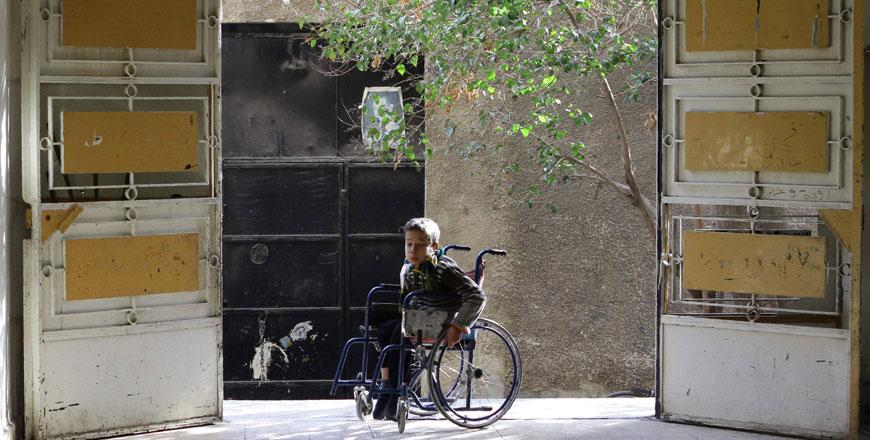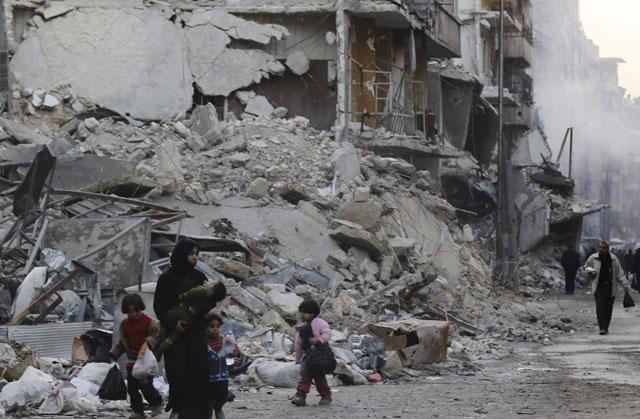You are here
Syria talks ‘likely’ delayed as opposition quarrels
By AFP - Jan 21,2016 - Last updated at Jan 21,2016

A child is seen in the doorway of the Ateiyah Al Ansary government-run shelter for displaced Syrians, in the Al Zahera neighbourhood of Damascus, on Thursday (AFP photo)
BEIRUT — The United Nations said Thursday that crucial talks on ending the Syrian conflict would likely be delayed by a few days, as a dispute over who will represent the opposition intensified.
The talks, due to start in Geneva on Monday, are part of the biggest diplomatic push yet to resolve a civil war that in nearly five years has left more than 260,000 dead and forced millions from their homes.
World powers agreed last year in Vienna on an 18-month roadmap that would lead to the peace talks, a transitional government and then elections.
But the office of UN Syria envoy Staffan de Mistura, who is hosting the talks, said the January 25 deadline for the start of talks would probably be missed.
"It is likely the 25th may slip by a few days for practical reasons," Jessy Chahine, a spokeswoman for de Mistura, told AFP in an e-mail.
"We are still aiming for that date and we will in any event assess progress over the weekend," she said.
US Secretary of State John Kerry said he was confident the talks would go ahead as planned.
“It may be a day or two for invitations, but there is not going to be a fundamental delay,” Kerry said on the sidelines of meetings at the World Economic Forum in Davos, Switzerland.
“The process will begin on the 25th and they will get together and see where we are,” he said.
Diplomats appeared to be scrambling to resolve the key question of who will represent Syria’s fractious opposition at the talks with President Bashar Assad’s regime.
‘Provocative step’
The main coalition of opposition bodies, the High Negotiations Committee, announced a delegation to the talks on Wednesday but its composition quickly came under fire.
The group named Mohamed Alloush, a political leader of the Saudi-backed Islamist armed group Jaish Al Islam, as its chief negotiator at the talks.
The National Coordinating Committee for Democratic Change, a key opposition body still present in Damascus, said it was “not acceptable” for the delegation’s chief to come from the armed opposition.
“This sends the wrong political message to the Syrian people,” it said.
Other opposition figures also protested and the pro-regime Al Watan daily called Alloush’s appointment “a provocative step with the sole goal of thwarting any possible dialogue”.
His participation was likely to be opposed by Syria’s foreign allies including Russia, which on Wednesday said it continues to consider Jaish Al Islam as a “terrorist” group.
There is also disagreement over whether the opposition will be represented by one or two delegations.
The High Negotiations Committee insists it must be the sole opposition representative, but other opposition figures and Syria’s Kurds have been excluded from its ranks and also want to participate in the talks.
Al Watan reported that Russia was proposing a joint opposition delegation, with half the members chosen by Moscow and the rest by the High Negotiations Committee.
A Syrian government source meanwhile said the country’s envoy to the United Nations, Bashar Al Jaafari, would serve as the regime’s chief negotiator at the talks.
Coalition to ‘accelerate’ strikes
Jaafari had the same role in a previous round of peace talks in Geneva in 2014.
Diplomatic sources downplayed concerns, saying it was more important to ensure the talks were credible than to worry about a brief delay.
“We want these negotiations to take place but we are not starting a process just for the sake of starting a process,” a French diplomatic source said.
“Nobody has any interest in a process that will last three days and then fail.”
The push for peace talks has been coupled with promises of increased military action against jihadists with the Daesh group in Syria and Iraq.
French President Francois Hollande said Thursday that the US-led coalition waging a bombing campaign against Daesh would “accelerate” air strikes on the group.
“The pace of the interventions will be accelerated and France will play its role in this,” Hollande said in a speech to ambassadors.
After meeting with key allies in Paris on Wednesday, US Defence Secretary Ashton Carter vowed to crush what he called the Daesh “cancer” by “collapsing its two power centres in Raqa [in Syria] and Mosul [in Iraq]”.
Hollande said defence ministers had also decided in Paris to “reinforce support to Arab and Kurdish forces fighting Daesh on the ground”.
Related Articles
BEIRUT — The killing of Syrian rebel chief Zahran Alloush, fiercely opposed to both the regime and the Daesh terror group, has eliminated a
ASTANA, Kazakhstan — Syria's government and rebel fighters will on Monday sit down at the negotiating table for the first time in nearly six
BEIRUT — Regime and rebel figures will head to Kazakhstan next Monday for negotiations on ending Syria's brutal war, but are arriving with d












